So You’ve Hit Burnout. Now What?
You’ve been holding it together—until you couldn’t anymore.
The deadlines. The kids. The calendar. The constant demands.
Maybe you’ve ignored the signs. Maybe you thought this is just what “being successful” looks like. Maybe you’ve kept going because you didn’t know how to stop.
But now?
You're running on fumes.
You don’t recognize yourself.
And something deep in you knows: this isn’t sustainable.
Let’s name it.
Let’s stop normalizing it.
And let’s begin—gently—again.
What Burnout Actually Is
Burnout isn’t just “being tired” or “having too much on your plate.”
It’s a state of chronic physical, mental, emotional and spiritual exhaustion caused by prolonged stress without adequate recovery.
It flattens your nervous system and hollows out your joy.
It’s when your body starts saying no for you—because you’ve stopped giving yourself permission.
Signs You’re Burned Out
Burnout doesn’t always scream. Sometimes, it whispers.
Mental Signs
Difficulty focusing or making decisions
Brain fog or forgetfulness
Procrastination, even on things you care about
Feeling like you’re just going through the motions
Constantly questioning your worth or competence
Emotional Signs
Mood swings, irritability, or emotional flatness
Apathy or a loss of excitement about life
Dread about facing the day—even when nothing’s “wrong”
Feeling alone, even when surrounded by people
Increased sensitivity to criticism or rejection
Physical Signs
Chronic fatigue, no matter how much you rest
Headaches, muscle pain, or unexplained tension
Digestive issues, gut imbalance, or appetite changes
Weakened immunity (getting sick more often)
Hormonal imbalances or cycle disruptions
Spiritual Signs
Feeling disconnected from your intuition or inner guidance
Loss of meaning or purpose in your work or daily life
A sense of spiritual dryness, emptiness, or restlessness
Cynicism toward things you used to believe in
A longing to “escape” or completely start over
Feeling like you’ve lost touch with who you really are
Now What?
Burnout doesn’t mean you’ve failed.
It means your current life pace, expectations, or coping strategies are no longer working.
It’s a request—sometimes a demand—for change.
Here’s what to do next.
1. Honour the Pause
You cannot heal in the same conditions that made you sick.
Step one isn’t to do more—it’s to stop.
Start with one full day of unscheduled time, or even one hour with no expectations.
Try this:
Cancel one non-essential obligation this week
Turn your phone on airplane mode for an evening
Take a nap because you’re tired—not because you earned it
Let yourself lie down, even if the dishes aren’t done
🧠 Affirmation: “I don’t have to earn rest. I need it to be well.”
2. Identify Your Energy Drains
Burnout is often death by a thousand paper cuts.
Track what’s draining your energy, even subtly.
Try this:
Make a “Stress Audit”: for 2–3 days, list what energizes you and what depletes you
Highlight the top 3 drains. Can you delegate, delay, or ditch one of them?
Watch for hidden leaks: people-pleasing, decision fatigue, always being “on”
🧠 Affirmation: “It’s safe to choose what supports me.”
3. Nourish Your Nervous System
Your nervous system needs soothing, not stimulation.
Your body needs rhythms, not rigidity.
Try this:
Morning sunlight exposure (10–20 minutes daily)
Deep belly breathing for 3 minutes before sleep
Walking in nature—no headphones
Epsom salt baths or magnesium before bed
Gentle movement: restorative yoga, stretching, or dancing
🧠 Affirmation: “I trust my body to guide my healing.”
4. Reconnect with Yourself (Slowly)
Burnout disconnects you—from joy, from creativity, from yourself.
Reconnection is the remedy.
Try this:
Reclaim one hobby or ritual you’ve abandoned
Journal: What part of me have I been silencing to keep up?
Start your day with one thing that’s just for you—tea, meditation, stillness
Block one hour each week as non-negotiable me-time (literally label it in your calendar)
🧠 Affirmation: “I matter.”
5. Ask for Support
Healing from burnout is not a solo act.
Ask yourself: Who could help lighten the load? Who can I tell the truth to?
Try this:
Text a trusted friend: “I’m feeling overwhelmed—can I talk something out with you?”
Book a therapy or coaching session (even just one can be a game-changer)
Hire help for one task: house cleaning, groceries, childcare, admin
Say “no” even if it feels uncomfortable (you’re allowed to disappoint people to honour yourself)
🧠 Affirmation: “Support is strength, not weakness.”
6. Create Micro-Moments of Joy + Meaning
You don’t need a big vacation to start feeling better.
You just need to interrupt the pattern—with tiny moments of aliveness.
Try this:
Light a candle with intention
Make a playlist that makes you feel like you again
Sit in a sunbeam for five full minutes and do nothing
Read one page of a book that inspires you
Write down one thing you’re proud of from the past week
🧠 Affirmation: “Joy is allowed—even now.”
The Slow Burn Approach
Burnout recovery isn’t a checklist—it’s a reclamation.
I help high-functioning, heart-led humans create lives that are not just successful on paper, but peaceful in practice.
Through integrative coaching, soulful retreats, movement, and reflection—I’ll help you pause, reconnect, and rebuild a life that feels as good as it looks.
Because burnout may have been your wake-up call…
But it’s not your story.
Not anymore.
